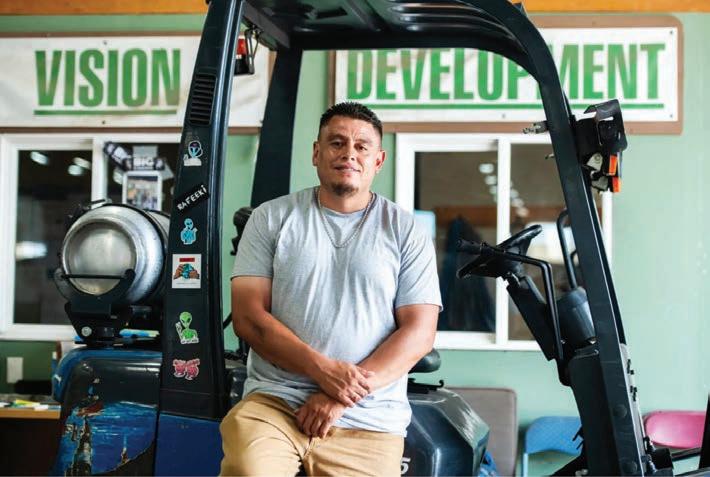
4 minute read
Donating gently used household goods
BY TAMARA CHUANG THE COLORADO SUN
Until about two-and-a-half years ago, Bobby Dainko was living in his car, addicted to meth.
Today, he’s clean and works full time at Spring Back Colorado Mattress Recycling, a nonpro t in Commerce City that recycles used mattresses that would otherwise end up in land lls. e nonpro t deliberately employs folks like Dainko — graduates of a nearby addiction treatment program.
“Yeah, I was living in my car right down the street here,” said Dainko, pointing out the window from an airconditioned o ce where he answers calls and schedules mattress pickups. “I just got sick and tired of what it takes to live homeless. I used to think, ‘Oh, you’re homeless. You don’t have to do anything.’ But no, it’s a daily battle. Hour by hour even. Where am I going? What am I doing? I did that for almost a year and got so sick of it. I called Wellness Court and they welcomed me back at 2 in the morning.”
Dainko had previously worked at Spring Back after graduating from the nearby Stout Street Foundation substance abuse recovery program in 2017. But he relapsed a year later, after his mother passed away. He just wasn’t done with drugs, he says now. But he believes he’s nally kicked his addiction for good. And Spring Back gave him his job back. “ e owner (Christopher Conway), he said, ‘Bobby, you’ve never lied to me, you’ve never stolen from me. ose are the two things I don’t tolerate. Yes, I’ll give you another chance.’ And he did,” said Dainko, who now has bene ts like health insurance. “And because of that, I got a second chance here.”
Uno cial and o cial workforce programs have been a source of labor for Colorado employers long before the pandemic and the ensuing labor shortage struck. But there’s another breed of workforce programs that help the planet, help consumers get rid of old stu and help people who have di culty nding work get a job. From diverting old computers and unwanted couches from land lls to refurbishing or upcycling materials for another life, the social enterprises often hover below the public radar. But some have caught the attention of the Colorado Department of Public Health & Environment, which awarded grants to many programs aimed at diverting waste from the land lls.
“We applaud companies working on recycling solutions, particularly when they accomplish that by developing socially responsible business models that help some of Colorado’s disadvantaged workers learn new skills,” Kendra Appelman-Eastvedt, the recycling grants program manager, wrote in an email.
Here’s a few of them, but please share others in your local community and we’ll compile a list for a future story.
Spring Back gets a shoutout from the city of Denver’s bulky-item disposal page. e company also partners with ve land lls around the state by providing a trailer to collect mattresses for recycling at $30 each. Otherwise land ll custom- ers often pay more to dispose of a mattress — it costs $74 at the Waste Management-operated Denver Arapahoe Disposal Site in Aurora. And yes, the mattress goes into the land ll, said a Waste Management employee who answered a pricing call. She suggested Spring Back for recycling mattresses at a lower price. Spring Back works with mattress stores to collect unwanted mattresses, and it has partnerships with a handful of land lls, including in Mesa and Larimer Counties, and several cities, including Pueblo, Loveland and Denver. In the Denver area, there’s mattress pick up. On an average week, Spring Back workers tear down between 1,500 to 2,000 unwanted mattresses; strip them for steel, foam, wood and other recyclable parts; and send very little to the land ll.
“ e environmental impact is huge. Long-term sustainability is really important. Working with cities and municipalities is great. But this whole thing was started out of the desire to help folks and really help them get their life turned around,” said Peter Conway, vice president of business development and the founder’s son. “ at’s the rewarding part, for me at least.”

Eric Gallegos, who completed the Stout Street program and graduates in February, plans to stay at Spring Back “for the long haul.”

Gallegos, who had the choice of prison or Stout Street, said that Stout Street showed him the path out of a life of drugs. Spring Back helps him stay on it.
“I’m comfortable here. I like to have a good, productive work day that challenges me. And this is labor intensive,” said Gallegos, who is from Trinidad. “When you make it through the day, you feel accomplished.”
Getting a job has long been part of Stout Street’s program, said Bradley Lucero, its executive director. e organization has worked with Spring Back for about a decade and also works with organizations like Food Bank of e Rockies and construction companies. It’s always looking for new partners willing to employ those at Stout Street, most who are there because their only other option was prison.
“ ey’re not used to getting up and going to work. ey’re not used to what minimum wage looks like, or living on $20 an hour because selling drugs, obviously they could make thousands of dollars in an afternoon,” Lucero said. “Having an idea of what a future looks like sober is huge.”
And for those who are tired of their old way of life and ready for more stability, the partnership with employers helps graduates get a second chance to reboot their work life.
“Some of them will take advantage of it, some of them will squander it,” Lucero said. “But for the most part, it’s folks that understand they have a criminal history and the longer they can keep a solid resume or build a solid resume, they understand that’ll help their odds down the road to apply and hopefully retain other positions.”








